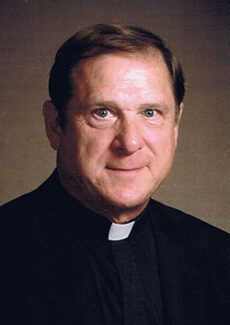Christian morality is motivated by love

Father R. Michael Schaab
By Father R. Michael Schaab
Twenty-Fourth Sunday in Ordinary Time/Sept. 13
Sirach 27:30 — 28:7; Psalm 103:1-2,3-4,9-10,11-12; Romans 14:7-9; Matthew 18:21-35
Those who study comparative religions often ask what is unique about Christian morality. They point out that the world’s great faiths agree to a large degree on ethical issues, to the extent that the teachings of Jesus of Nazareth are no different from any other religious leader. Today’s readings demonstrate exactly what makes Christ’s moral teachings distinct.
The Alleluia verse which precedes the Gospel says it all: “I give you a new commandment says the Lord; love one another as I have loved you.” What makes Christian morality unique is its motivation — love. Most codes of morality look to the Golden Rule for their validity: “Do unto others as you would have them do unto you.” It’s almost as if we are guided by self-interest. We are to treat others in the same way we want to be treated ourselves. We rather selfishly make ourselves the arbiters of moral behavior. As they say, it’s all about me.
But Jesus says it’s not all about me. Love is all about the other person, being willing to lay down our lives for our neighbor. In the second reading Paul makes this point clear when he writes to the church in Rome and tells them “none of us lives for oneself, and no one of us dies for oneself.” We, like Christ, are to be motivated by love and to live and die for someone else. We are to live for the Lord and to die for the Lord. Our motivation in all thoughts, words and actions must be love.
TAKING THE NEXT STEP
Actually, all topics in Christian morality are simply an application or ramification of this Law of Love. The first reading from the Book of Sirach and the Gospel from Matthew focus us on the topic of forgiveness. Both authors advocate for forgiveness but note the difference in motivation between these two readings.
In the reading from Sirach the motivation for forgiving is actually self-interest: “Forgive your neighbor’s injustice; then when you pray, your own sins will be forgiven.” This was the same motivation that Jesus referenced back in the sixth chapter of Matthew’s Gospel when he instructed his followers to pray: “Forgive us our debts, as we have also forgiven our debtors.” But by the 18th chapter of Matthew’s Gospel, in today’s reading, Jesus it ready to lead his followers more deeply into the mystery of the nature of God. He shares with them that God’s motivation for forgiveness is love.
In the Gospel parable about “a king who decided to settle accounts with his servants,” the king represents God. In dealing with a servant who was deeply in debt to him, he was moved with compassion, let the servant go and forgave him the loan. When that same servant dealt with another servant who owed him a much smaller amount, he refused to forgive him. The king condemned the first servant saying, “Should you not have had pity on your fellow servant, as I had pity on you?” Note the motivation for forgiveness, compassion and pity not self-interest. The king gives an example of the Law of Love in action, and he expects us to follow his example. To enter into the mystery of God is to allow love to be our moral motivation.
The Responsorial Psalm reminds us that God pardons all our iniquities, heals all our ills, redeems us from destruction and crowns us with compassion. Now we are called upon to employ that same divine compassion in forgiving others. We all know too well the human way: “Wrath and anger are hateful things, yet the sinner hugs them tight.” The divine way, Jesus says, “is to forgive your brother or sister from your heart.” It’s all about motivation.
There’s the age-old question, “What came first, the chicken or the egg?” Today’s readings raise another question, “Do we forgive first, so that God has to forgive us?” or “Does God forgive us first in order to empower us to forgive others?” Whatever the answer, it’s all about love.
—
Father R. Michael Schaab is a senior priest of the Diocese of Peoria who gives retreats and days of recollection, and who fills in as presider at parish Masses on weekends. He resides on a hobby farm in Putnam County.





